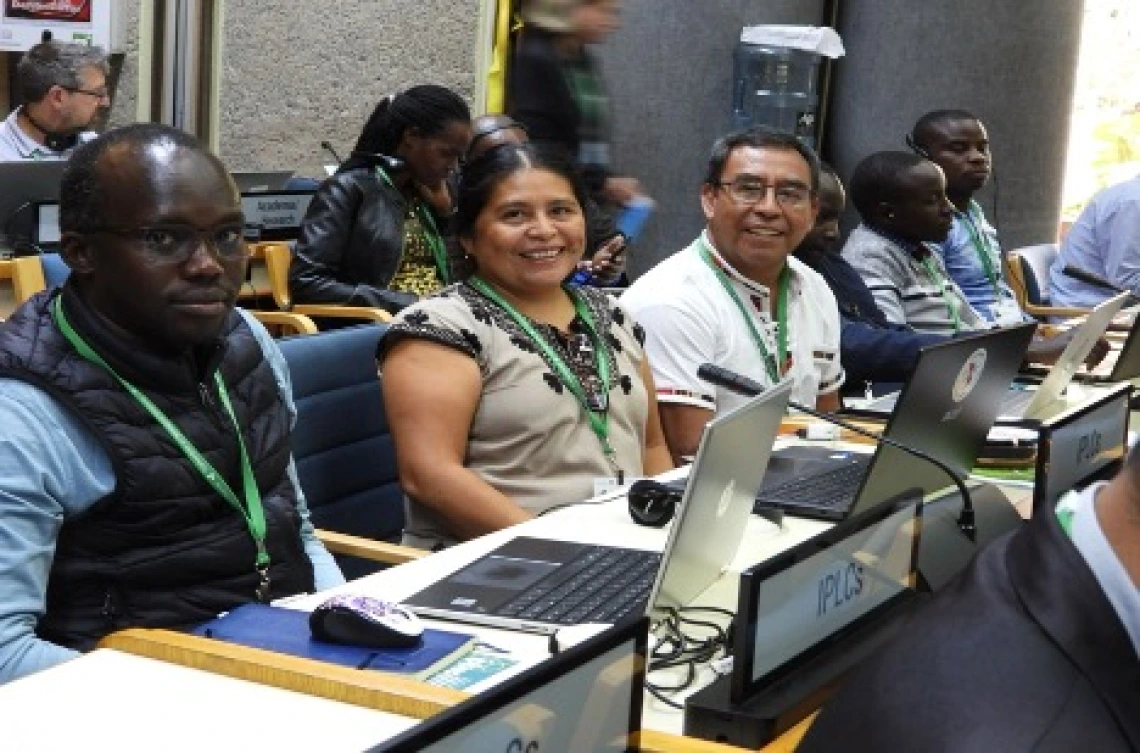Meeting with the CBD Secretary on the Need to Separate Indigenous Peoples and Local Communities Being Two Unique Entities

Indigenous Peoples Delegates following CBD session in Nairobi-Kenya UNEP Offices.
On October 17, 2023, Washington Barasa Kiptoo (“Kiptoo”), IPLP Bay and Paul Foundations Fellow, together with delegates from the International Indian Treaty Council (IITC), while attending the Subsidiary Body on Science Technical and Technological Advice (SABSSTA) of the Convention on Biological Diversity (CBD) conference in Nairobi met with Mr. David Cooper, the Acting Executive Secretary of the Convention on Biodiversity (CBD). The Indigenous Peoples representatives called for the prioritization of the proposal to review Article 8(j) of the CBD, which used the phrase “Indigenous and local communities,” thus conflating two distinct groups in their view. The provision, as asserted by the representatives, has significantly undermined Indigenous Peoples' position as a unique and critical stakeholder in the CBD processes. The provision, it was also noted, further weakens the jurisprudential development and evolution of the rights of Indigenous Peoples.
A representative of the International Indian Treaty Council Mr. Juan Leon opened the meeting, introduced the delegates, and explained the IITC’s position. Perspectives of Latin American and African Indigenous representatives on the clawback effects of the provision were also provided. Notably, stress was given to the effect of Article 8 (j) on the status of Indigenous Peoples of Africa where it is argued that all peoples are Indigenous to Africa. The conflation of Indigenous Peoples and Local Communities will have the effect of diminishing the special status and rights of Indigenous Peoples which have been internationally recognized. African States have so far failed to fulfill indigenous Peoples' rights as provided in the UNDRIP.
Executive Secretary Cooper confirmed to the delegates that he was aware of the recommendation to review the Convention. He said that the recommendation has been transmitted to the CBD Working Group and will be deliberated and form a substantial agenda item during the CBD conference in Geneva in November 2023. He welcomed the delegates to participate fully in the discussions in Geneva.
The Secretary acknowledged the positive developments since the Convention was passed in 1992 when state parties deliberately inserted the phrase, “Indigenous and local communities.” He noted that a positive development happened post-UNDRIP 2007 when the text changed from “Indigenous and local communities” to the phrasing now incorporated into the Convention “Indigenous Peoples and Local Communities”.
The Secretary indicated that the review may take place later and require some patience. He also indicated that the rights of Indigenous Peoples with respect to their lands and natural resources are a cross-cutting issue in the Kunming-Montreal Global Biodiversity Framework. The available funding mechanisms have also considered the rights of Indigenous Peoples.
University of Arizona IPLP alumni, Q’’apaj Conde, a representative of the CBD Secretariat and a co-chair of the International Indigenous Forum on Biodiversity, observed that Francisco Ramiro Co-Chair of the International Indigenous Forum on Biodiversity (IIFB) was going to introduce the matter in the upcoming Geneva meeting. He acknowledged that the term “local communities” is too broad to be considered together with Indigenous Peoples.
It was during the meeting that the delegates shared the below intervention about Article 8(j) of the CBD.
An intervention shared with the CBD Secretariat.
The International Indian Treaty Council (IITC) notes with concern the continued use of the phraseology ‘Indigenous Peoples and Local Communities (IPLC)’ as a disservice to both groups. Indigenous Peoples have long been recognized as a distinct constituency at the UN, with sui generis rights. Therefore, lumping them together with another group undermines the sui generis nature of the rights inherent to Indigenous Peoples recognized and affirmed in the UN Declaration on the Rights of Indigenous Peoples.
The IITC calls the attention of the State parties and CBD secretariat including participating stakeholders, attending the CBD SBSTTA in Nairobi in October 2023, to put into practice the recommendations made by the three United Nations Indigenous-specific mandates, namely the United Nations Permanent Forum on Indigenous Issues (UNPFII), the Special Rapporteur on the Rights of Indigenous Peoples, and the United Nations Expert Mechanism on the Rights of Indigenous Peoples (EMRIP). These entities have so far taken a similar standpoint and communicated their decisions to the UN Human Rights Council and Member States to push for the amendment of United Nations conventions and processes, such as the CBD, that continue to use the term Indigenous Peoples and Local communities thus creating distortion, ambiguity, and diminishing the content of the Declaration of the United Nations on Indigenous Peoples.
In part, the three mechanisms statement read,
"We take our responsibility seriously in assisting UN entities in respecting and promoting the realization of these rights consistent with those affirmed in the UN Declaration on the Rights of Indigenous Peoples. Therefore, we, the UN mechanisms of Indigenous Peoples, urge all UN entities in their methods of work to refrain from conflating, associating, combining, or equating Indigenous Peoples with non-indigenous entities, such as minorities, vulnerable groups, or "local communities." We further request that all UN Member State parties to treaties related to the environment, biodiversity, and climate cease using the term "local communities" alongside "Indigenous Peoples" so that the term "Indigenous Peoples and local communities" is no longer used”.
IITC considers this as the right time for State Parties of the CBD to harmonize the content of the UNDRIP with the Convention to avoid confusion. IITC offers itself to provide support to the CBD on how to proceed with this proposal.
Finally, we have attached the statement of recommendation which the three mechanisms referred to above issued.

